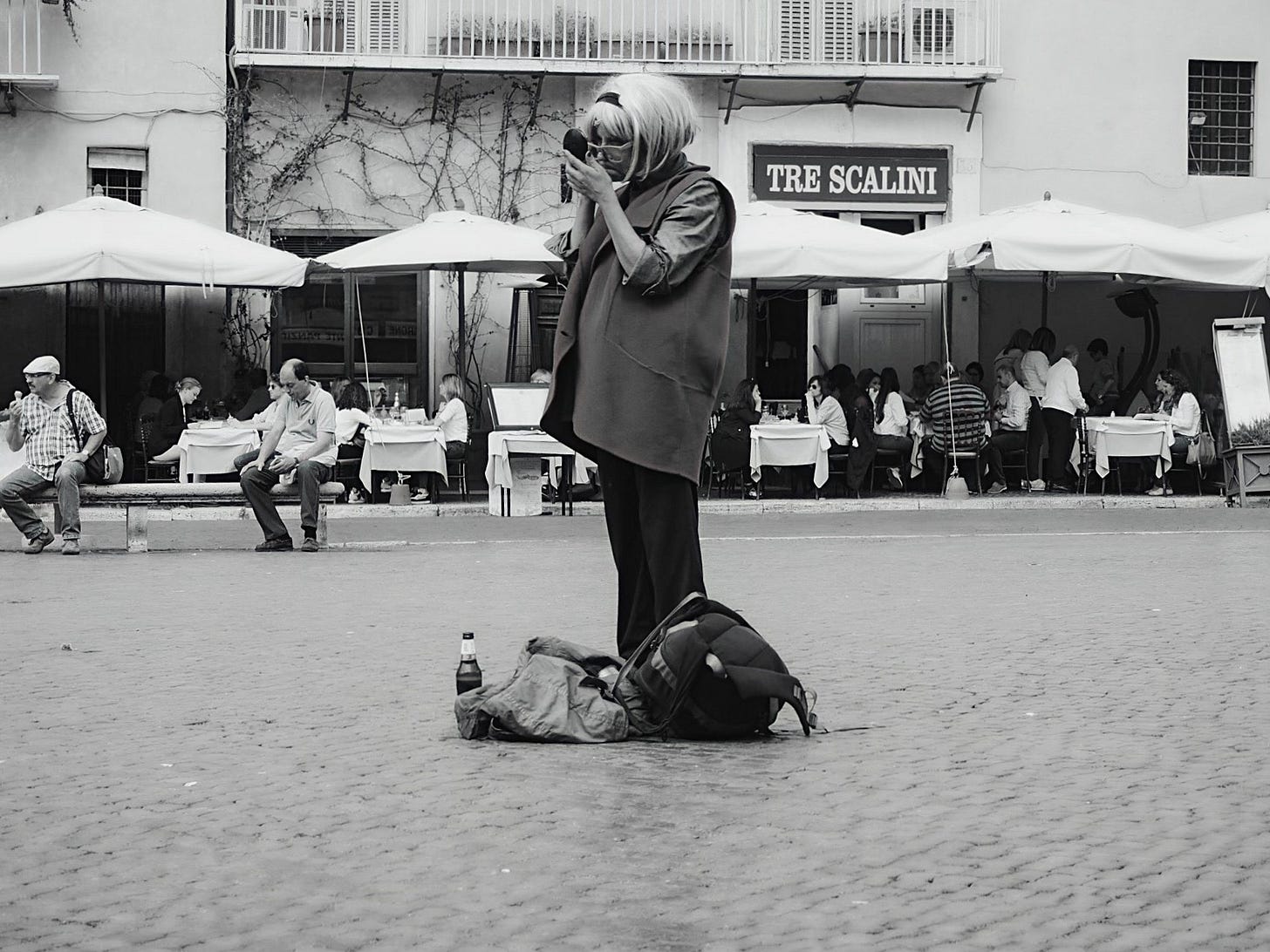Photographed in the streets of Rome.
A moment no one applauded.
But one that spoke volumes.
——————————————————
Some versions of ourselves are still hanging in the hallways of people we no longer speak to.
Others we’ve buried deep beneath our skin and now call them the past.
And then there are those that only return in dreams.
Silent, formless — but still speaking in our voice.
And some of us — some of us stand in the middle of the city today,
with a backpack on the pavement, a beer nearby,
and a small mirror in hand,
as if there’s still something worth smoothing out.
How many versions of herself has that woman already shed?
How many coats has she taken off before she ended up here —
wrapped in a shawl that doesn’t protect her from the cold,
but from invisibility?
She puts on makeup.
Not to look good for the world.
But because she still remembers what it felt like to have a face.
And what might seem ridiculous to others,
may actually be her bravest act of the day —
to quietly remind herself
that she still exists.
All of us have worn coats.
Versions that were too tight, or unbearably loose.
Sometimes we played strong. Sometimes fragile.
And we’ve all done things we’re not proud of.
We’ve hurt. We’ve failed. We’ve run.
Some of us are still running —
just wearing a newer coat over the same old stories.
Cleaner. Shinier. More expensive.
But still a coat.
And then there are those like her.
The ones who stripped all the way down.
The ones who have nothing left to hide,
because there’s nowhere left to hide.
And still, she puts on lipstick.
Right there, on the street.
Because she believes even that deserves to survive —
dignity, in the color of raspberries.
So we ask again:
How many versions of ourselves have people shed?
How many coats were taken off quietly, with no applause, no witness?
How many faces had to relearn how to trust their own reflection?
The quiet ones. The loud ones. The ones who waited. The ones who ran.
The strong. The broken.
And those who gathered their pieces
and built something mosaic out of what shattered.
And perhaps that’s when the most honest version is born.
Not the one that pleases.
But the one that knows —
that none of the previous versions were mistakes.
They were just necessary layers.
For survival. For understanding. For learning to love.
Or to be alone.
Or to learn what it really means to say “I’m sorry.”
Not just to others — but to yourself.
But what does it even mean — to shed your layers?
It’s not like taking off a coat and hanging it up neatly.
It’s a process that aches.
Sometimes you lose a relationship. Sometimes your faith.
You have to pass through a silence that doesn’t hear you.
You learn that some things won’t come back —
not closure, not justice, not even understanding.
To shed your layers is to stop performing.
To stop explaining.
To stop waiting for someone to save you by finally getting it right.
You’ll know someone’s done it
when they no longer need to defend anything.
When they look you in the eyes
and hide nothing —
not their pain, not their shame, not their pride.
Just the quiet gaze of someone who knows what they’ve lived through.
And they don’t exaggerate it.
They don’t decorate it.
They just are.
And then there are the others.
The ones who perform having shed their coats —
who declare themselves new, free, “authentic.”
And they make sure you know it.
Loudly. Often. Proudly.
But the more they speak of it,
the more it becomes just another layer.
Softer. Shinier. More spiritual.
But still a layer.
True shedding is quiet.
So quiet it hurts.
To shed your layers doesn’t mean being strong.
It means bearing your own gaze — without defense, without decoration,
without needing to convince anyone of anything.
It means walking home without a mask,
even when there’s no one waiting at the door.
And maybe the greatest strength isn’t that she has something to drink.
But that she still remembers who she was,
and refuses to fully let it go.
Because falling doesn’t mean sitting on the ground.
Falling means no longer wanting to get back up.
And her — even standing there,
between backpacks and shadows —
she’s still looking at herself.
Still putting on makeup.
Still saying, without words:
“I didn’t let the world take everything.”
And maybe that’s when the real kind of beauty is born.
Not the kind that asks for admiration.
But the kind that knows how to survive without it.
⸻
Dedicated to those who, even in a world that stopped seeing them,
still manage to perform quiet acts of dignity.
To those who stand on stone streets with their heads held high —
not to be admired,
but because even dignity has its quieter forms.
To those who may no longer wait for applause,
yet haven’t forgotten who they are.
And to those who know:
that true strength often doesn’t appear when we’re celebrated —
but when we’re completely overlooked,
and still carry within us the quiet: “I’m here.”




Dora, this is truly a quiet masterpiece, each line feels rooted in sacred intention and weaved gracefully in tribute to the layers we shed and the dignity we carry - even when no one is looking. The read moves like a meditative prayer - raw, soft and fiercely dignified. I loved this, beautifully written and thank you for sharing. There’s so many lines I will be taking away with me, and I was going to quote a few but there are too many! Your writing is truly stunning and the themes explored always move me unexpectedly.
I have been walking around with a dark heavy mass in my chest all day. It’s so hard sometimes and this quietly helped - thanks